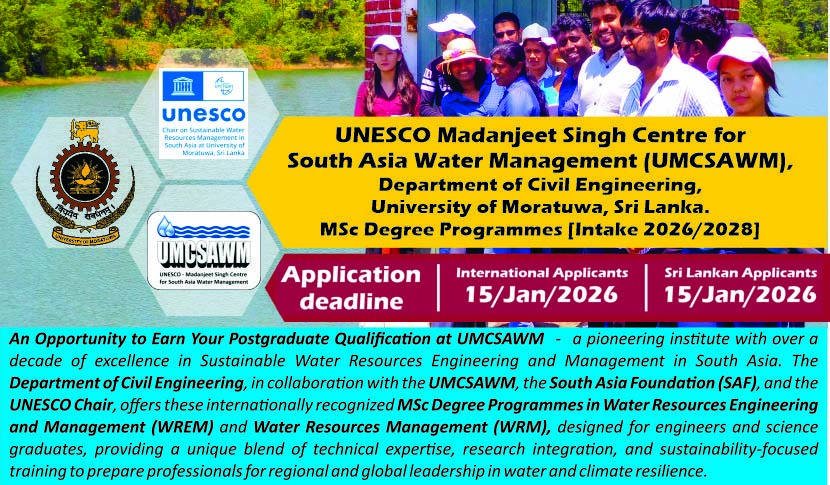
UMCSAWM Showcases Research Excellence at the Regional Climate Change Conference (RCCC) 2025
The Regional Climate Change Conference (RCCC 2025), organized by the IHE-Delft with UMCSAWM-University of Moratuwa as an Academic partner, under the theme “The Intersection of Climate Science, Adaptation, and Climate Financing: Focus on the Global South and Inclusivity”, was successfully held from 13th to 15th October 2025 at the Taj Samudra Hotel, Colombo, Sri Lanka.
The conference served as a dynamic platform where science, policy, and innovation converged, emphasizing the critical role of the Global South in addressing the escalating challenges of climate change. With over 130 participants representing more than 26 countries, the event brought together researchers, policymakers, practitioners, and development partners to exchange knowledge and foster collaboration for climate resilience.
The UNESCO Madanjeet Singh Centre for South Asia Water Management (UMCSAWM) of the University of Moratuwa an academic partner of the event. UMCSAWM delegates, including faculty members and postgraduate researchers, actively participated by hosting a Special Session entitled “Integrated Modeling Approaches for Managing Climate-Resilient Water Systems and Hydroclimatic Extremes” and through paper and abstract presentations, chairing technical sessions, and interactive networking discussions, contributing to the regional dialogue on climate adaptation and financing mechanisms.
Dr. Luminda Gunawardhana (Senior Lecturer from the Department of Civil Engineering/UMCSAWM) delivered a keynote speech titled “Beyond Conventional Drought Analysis: Unlocking Hidden Characteristics and New Possibilities under Climate Change with Advanced Remote Sensing”, attended by all participants.
Another outstanding accomplishment at the conference was the recognition of Ms. Paboda Jayawardane, a Department of Civil Engineering/UMCSAWM postgraduate researcher, who earned the Best Presentation Award under the session “Integrated Modeling Approaches for Managing Climate-Resilient Water Systems and Hydroclimatic Extremes”. Her MSc research, titled “Assessing the Efficacy of Physics-Informed Neural Networks in Flood Routing Simulations”, received high recognition for its innovative integration of machine learning and hydrological modeling to enhance flood forecasting accuracy.
RCCC 2025 provided a unique opportunity to share scientific findings, field-based experiences, and policy innovations from diverse climate-vulnerable regions. A special emphasis was placed on empowering early-career professionals and female researchers, fostering inclusivity and leadership within climate science communities of the Global South.
The conference outcomes are expected to pave the way for enhanced regional cooperation, improved climate modelling and risk assessment methods, and sustainable financing frameworks that bridge the gap between climate research and on-ground implementation.












Copyright © 2026 UNESCO Madanjeet Singh Centre for South Asia Water Management
WordPress Theme by WPZOOM

